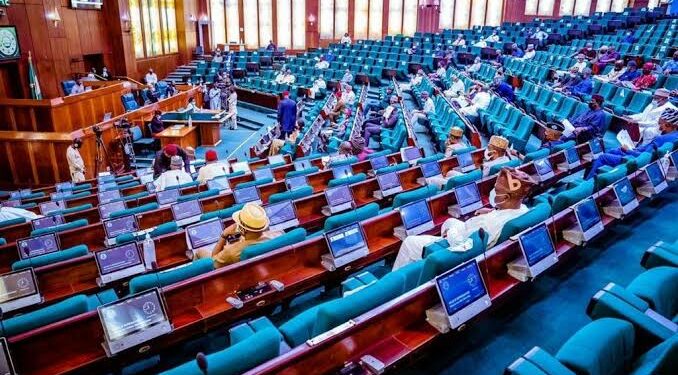The House of Representatives Special Committee on Crude Oil Theft and Losses has underscored the need for an overhaul of security architecture around oil and gas infrastructure as part of measures aimed at tackling oil theft.
Chairman of the Committee, Hon. Alhassan Ado-Doguwa who gave the charge at the weekend, during a special engagement with the Chief of Naval Staff, Vice Admiral Emmanuel Ogala, therefore appealed to the authorities of the Nigerian Navy to assist the Special Committee with relevant information that would aid ongoing investigation towards unravel those behind the perennial stealing of the country’s crude oil.
While giving assurance that information obtained confidentially by the Committee shall be handled with utmost care, Hon. Ado-Doguwa lamented that: “crude oil theft is a major concern to the economy of our country, Nigeria, and on that note, we feel we have to extend hands of fellowship to the relevant security stakeholders that have long been existing on the space to fight against these criminalities.
“You can all recall that in the recent projection for the year 2024, the Parliament budgeted about N28.77 trillion based on a crude oil benchmark of $77.96 per barrel and the production of 1.78 million barrels per day.
“In January 2024, Nigeria’s oil production rose to about 1.42 million barrels per day, this represents an increase of about 6.85 per cent compared to the production figure of 1.39 million barrels per day in December 2023.
“Though there seems to be a gradual improvement in oil production, we are still below the OPEC quota of 1.58 million barrels per day in the 2024 budget benchmark.
“The major reason the country is not meeting her production targets is largely attributed to crude oil theft. This theft is being carried out in collusion, that not only threatens the economy of the country but has even precipitated a crisis bothering national security.
“You may recall that in the 2022 NEITI report, which is the key parameter for our economic projections, the Agency stated that about 619.7 million barrels of crude oil valued at over $46.16 billion was stolen within the period of 12 years,” a situation he observed has been reported variously in the media as the situation seems not to be abating.
“In order to address these criminalities, the House instituted this Special Committee and charged it with the responsibility of investigating all dimensions of oil theft and with a view to bringing all culprits to book.
He said the Committee has since commenced legislative work, engaging strategic stakeholders and will soon begin public investigative hearings on identified malpractices.
He recalled that on Friday, February 9, 2024, the Committee visited a site of arrested two vessels in Delta State, for involvement in crude oil theft, saying “these occurrences call for an overhaul of the security architecture around the oil and gas infrastructure and the nation’s marine environment.
“We need to strengthen the collaboration among the security agencies and also the private security that we have on the ground,” Ado-Doguwa noted.
In his remarks, Chief of Naval Staff, Vice Admiral Emmanuel Ogala who acknowledged that oil theft is a major challenge to the country’s economy, observed the recent report by NNPC Limited on the rise of crude oil production to about 1.78mbpd, which it said was the highest in last three years, as still being below Nigeria’s OPEC quota, giving assurance that the Navy will work in collaboration with others to ensure the quota is met.
He however lamented the shortage of personnel in the face of the vastness of the country’s waterways which he said was over one-tenth of Nigeria’s land space, saying the Navy has less than 30,000 personnel to man the vast sea space with operational guidelines of policing, enforcing and assisting in coordinating enforcement.
While stressing that some of the roles in securing the waterways were not exclusive to the Navy, Ogala said the Navy has adopted a framework for a total maritime safety strategy, but that “there must be adequate collaboration with other agencies, and working with communities, international organizations and others”.
He said the Nigerian Navy has been doing a lot in tackling crude oil theft, but it does not say much about that in the media, as according to him, 34 vessels have been arrested between July 2023 to date, and have been subjected to requisite investigation, with some already facing prosecution by the concerned agencies, including the police and the EFCC.
“We have a big task to ensure that we meet the oil production target in the budget. You also stated that there has been a gradual increase in our crude oil production, that is a fact. When we came on board last year, it was maybe 1.1mbpd, and as you stated, we now have 1.4mbpd, which is still below our OPEC quota…all these improvements are not yet enough because we have not met the quota, but the capacity to meet the quota.
On stolen crude, he said the quoted figures might be true, and might not be true, noting that oil theft is a generic term, as details of what constitutes oil theft are in multiple dimensions, including pipeline vandalism, and at a larger scale, the use of vessels to move crude oil illegally.
He also blamed some major oil companies for failing to seal disused oil well heads as the standard is globally, after leaving such wells when considered no longer commercially viable, saying those operating illegal refineries take advantage of the oil well heads to scoop.
The Naval Chief subsequently named two desk officers to work in collaboration with the Committee of the House.
